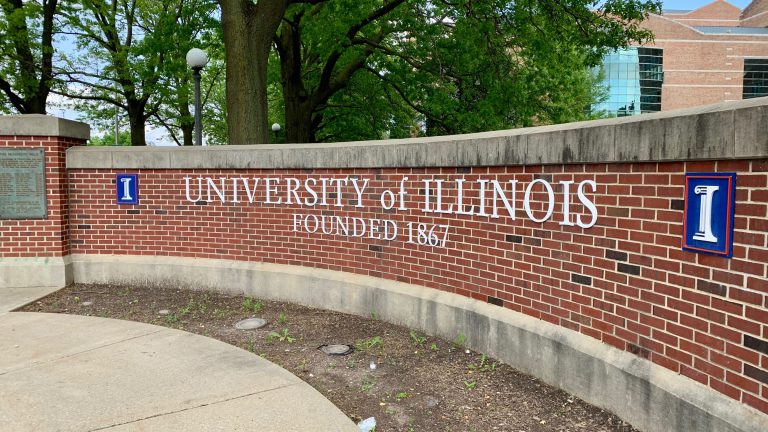Editor’s Note: This story has been updated to clarify the Campus Faculty Association’s role at the University of Illinois. A previous version of this article described the group as a labor union. It is not. The CFA is an advocacy group.
URBANA – As University of Illinois officials deliberate over how to reopen the Urbana campus this fall, an organization representing some U of I faculty members say they don’t believe the university can safely allow tens of thousands of students back into residence halls and classrooms this year.
The Campus Faculty Association, an advocacy group comprised of mostly tenured and tenure-track faculty members, is affiliated with the the American Association of University Professors and the American Federation of Teachers and claims to include more than 200 faculty members. The CFA released a statement Thursday opposing reopening the campus to face-to-face instruction this fall, and calling on the university to use its financial resources, including its endowment, to weather expected revenue losses.
University administrators have yet to make a final decision about how the campus will resume instruction later this year. That decision is expected to be announced by mid-June.
A message sent to staff by Vice Chancellor for Academic Affairs and Provost Andreas Cangellaris earlier this week states that campus officials are “hopeful that the fall semester will be delivered through some hybrid of in-person and remote delivery.”
The message states the campus will implement steps recommended by public health officials, including limiting in-person class sizes to 20% to 35% of their normal capacity levels, and modifying class schedules to allow for more time between classes, thereby reducing density in hallways and public spaces.
Bruce Rosenstock, a professor of religion and a member of the CFA, says the group believes the university risks an outbreak of COVID-19 if in-person instruction resumes and thousands of students return to live on campus this fall. He says most fall courses will be taught online.
“And so we felt that the dangers posed to the students, to the faculty themselves, to the staff and to the workers and the wider Champaign-Urbana community just made it imperative that we speak up now,” Rosenstock says. “So that there can be an open, transparent conversation among all of our faculty, but also within the wider community, about the decision that seems to have already been made, and which we very firmly believe is the wrong decision — namely to open the university up to as many students as are wanting and are able to come.”
A spokesperson for the Urbana campus did not respond to a request for comment on the CFA statement. The Senate of the Urbana-Champaign Campus, a legislative body comprised of faculty, students and some academic professionals, has not yet released a statement on the issue.
Rosenstock says he believes most parents and students won’t want to be on campus given that the social distancing precautions will make such an experience less attractive.
“They are also getting the opportunity to be responsible for a spread — it’s called a ‘super spreader event’ — that would begin on our campus and would spread to the wider eastern Illinois community and also Urbana-Champaign, where there will be deaths,” he says.
Rosenstock says there’s also the chance that the university will be forced to close its campus once again if there’s a spike in COVID-19 cases come autumn.
“No administrator will tell you that that is not a risk,” he says. Rosenstock is also concerned that students who do test positive for the virus while on campus, and are sent home as a result, could spread the infection to people in other communities.
In his message to staff earlier this week, Cangellaris wrote that the university will provide “flexible and equally accessible alternative options that allow for the protection or isolation of students, faculty and instructional staff who are unable to participate in in-person instructional environments.”
The university is also dealing with a financial shortfall resulting from the pandemic.
The U of I system estimates losses totaling more than $158 million through June as a result of the COVID-19 crisis. Universities across the country are weighing concerns about safety with fears that students may choose not to enroll in the fall if in-person instruction does not resume.
But Rosenstock says the university can weather this financial storm and avoid lay-offs, while also ensuring the safety of students and staff. He points to the state budget crisis several years ago that cut off state funding to the university for a prolonged period of time.
“The total loss of our state funding — we weathered that. We have the ability to weather an even somewhat significant loss in our tuition revenue stream… We can survive it,” he says.
In their statement, the CFA calls for the creation of an “emergency alternative budget,” and suggests the university draw on emergency funds from its endowment to cope with the financial hit.
Rosenstock says he is immensely proud of the expertise university staff have provided state officials during the COVID-19 public health crisis, as well as the innovations in healthcare technology occurring on campus. He fears, however, that those positive contributions could be overshadowed by an outbreak on campus in the fall.
“This is the tragic possibility that those amazing resources and the great, great good that we can do for our community will be offset by a needless catastrophe of our own making,” Rosenstock says.

